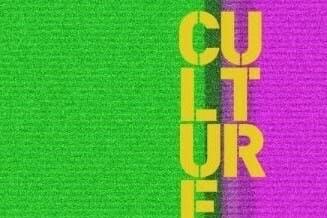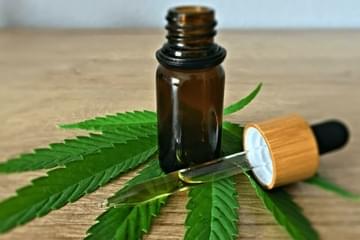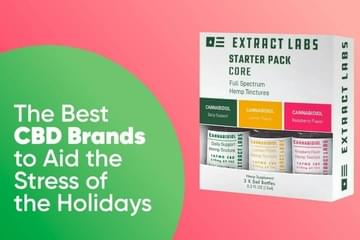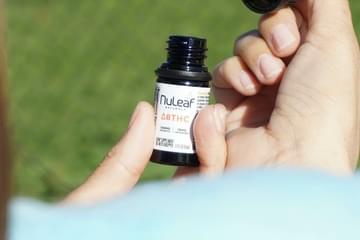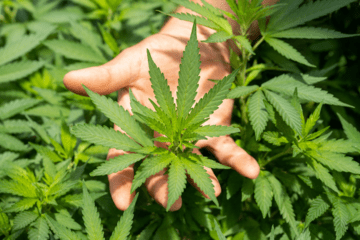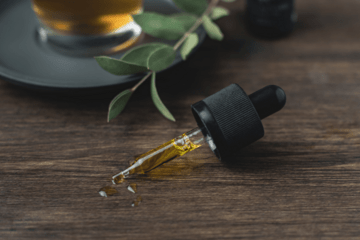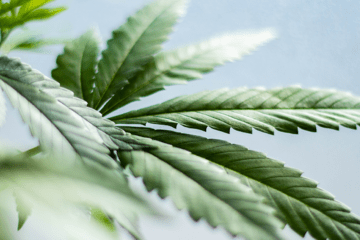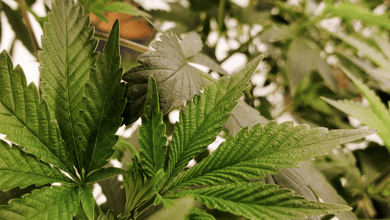
How Does CBD Interact With THC?
Published on 6/7/21
The 2018 Farm Bill (the Agriculture Improvement Act) removed hemp from the Controlled Substances Act, effectively making CBD federally legal. Since then, CBD has continued to boom as an alternative medical supplement and cultural phenomenon. Now, 17 states and Washington, D.C. legalized recreational marijuana, and a total of 36 states have some form of a state-funded medical marijuana program. With THC and CBD both become increasingly and legally available, more people are likely asking a very important question: how does CBD with THC affect me? We're here to answer that very question.
The Difference Between CBD and THC
 Unsplash
UnsplashWhile CBD and THC are the two primary cannabinoids found in cannabis and share several beneficial side effects, they differ in several key ways. First of all, we only get THC (tetrahydrocannabinol) extracted from cannabis, while we find CBD (cannabidiol) in both cannabis and hemp plants. THC can be found in hemp but only in nominal amounts (usually less than 0.3%) that will not likely have a noticeable effect on your body if consumed. Secondly, and probably the most significant, is that CBD is not psychoactive and will not result in feeling "high" if consumed. THC, on the other hand, is the leading psychoactive compound in marijuana that produces the high so often associated with weed.
Other differences include their medical benefits. Both CBD and THC are used to provide chronic pain relief and reduce depression and anxiety, but many people prefer CBD because it lacks THC's psychoactive properties. THC is commonly used to treat muscle spasms and pain, decreased appetites and eating disorders, nausea and potentially alleviate the side effects of Alzheimer's and cancer. CBD, on the other hand, is commonly used to reduce pain associated with multiple sclerosis and inflammation, along with suppressing the intensity and frequency of seizures. Either way, more studies point to both THC and CBD as medically viable alternatives for a variety of conditions and ailments.
How CBD & THC Affect the Endocannabinoid System
Another way CBD and THC are different, yet closely related, is how they interact with the endocannabinoid system, which is responsible for regulating several very important bodily functions. There are two primary receptors within the endocannabinoid system, CB1 and CB2 receptors, which respond to endocannabinoids that our bodies naturally produce and external cannabinoids like THC and CBD. When consumed, CBD binds with the CB2 receptor, which is found in the peripheral nervous system and is known to regulate appetite, inflammation, pain management and the immune system. On the other hand, THC primarily binds with CB1 receptors (although it can also bind with CB2 receptors), which are found in the central nervous system, lungs, kidneys, liver and brain. CB1 receptors are known to regulate things such as pain, nausea and mood-related functions. It is largely because THC and CBD affect the endocannabinoid system differently that they work so well when taken together.
The Entourage Effect
 Unsplash
UnsplashCannabis is made up of hundreds of chemical compounds - all of which interact with the endocannabinoid system differently - and when they are experienced together, these compounds create what we've come to know as the entourage effect. Let's specifically dive into the benefits of CBD and THC together. On its own, THC causes a euphoric psychoactive effect that intensifies with increased concentration. CBD, on the other hand, is a natural relaxant and is commonly used on its own for that reason. However, when used together, CBD will regulate the intensity of THC, providing more stability and a calming aspect to the psychoactive experience of THC. CBD affects how THC binds to the endocannabinoid system receptors and the positive effects of both cannabinoids are accentuated - this is a large part of the cannabis entourage effect. While on their own, these two cannabinoids have plenty of benefits; but when used together, a more complete, balanced experience presents itself.
How to Use CBD & THC Together
The Right Ratio of THC & CBD
Modern cannabis understands this balance and uses it to create unique experiences. Strains differ from each other for many reasons, and one of the most prominent differences is in the ratio of THC and CBD. Weed with little to no CBD will provide a very different, more intense high than weed with a stronger CBD percentage. While not always true, a good rule of thumb is that sativas will have hardly any CBD and indicas will have more CBD. Everyone has different preferences, but it's important to try and find your correct ratio slowly and intentionally. Here are a few tips for finding the right CBD and THC balance:
Talk to Your Local Budtender
When in doubt, budtenders are an incredible resource. Go to your local dispensary and ask your budtender what they suggest for the type of high your looking for. Be ready to answer these questions. What type of high are you looking for? Is there any specific reason you want to get high (medical or recreational)? How much do you normally smoke? What type of consumption method do you prefer? All of these questions will help a budtender better understand where to direct you.
Talk to a Medical Marijuana Doctor
 Unsplash
UnsplashOf course, budtenders love cannabis and have a lot of opinions, but their advice is not medical advice. If you want a medical opinion on what CBD and THC oil balance you should be looking for, talk to a medical marijuana doctor (MMJ doctor). They will be able to answer a lot of the same questions you ask your budtender and will be able to help you best if you have a specific reason you're using cannabis.
Start With Lower Doses of THC
If you'd rather just figure it out on your own, we recommend you begin with lower THC-level strains. Getting too high is rarely a fun experience and it's especially not fun when you're first beginning. Microdose and slowly experiment with a greater disparity between THC and CBD until you find what you're looking for.
Using CBD Without THC
So, if THC and CBD help create the entourage effect to provide more potent benefits, does CBD need THC to work? The answer, luckily, is no. While there are benefits to the entourage effect CBD is still reported to have ample benefits when used on its own. More studies are needed to conclusively state CBD's medical benefits, but plenty of users swear by it and there is even an FDA-approved CBD drug for treating a rare form of childhood epilepsy. If you don't want CBD oil with THC in it because of the psychoactive effects, CBD on its own can still provide pain and anxiety relief, along with other benefits.
Do you have a favorite ratio of CBD and THC? Let us know how much, what strains and why it's your favorite in the comments below!









